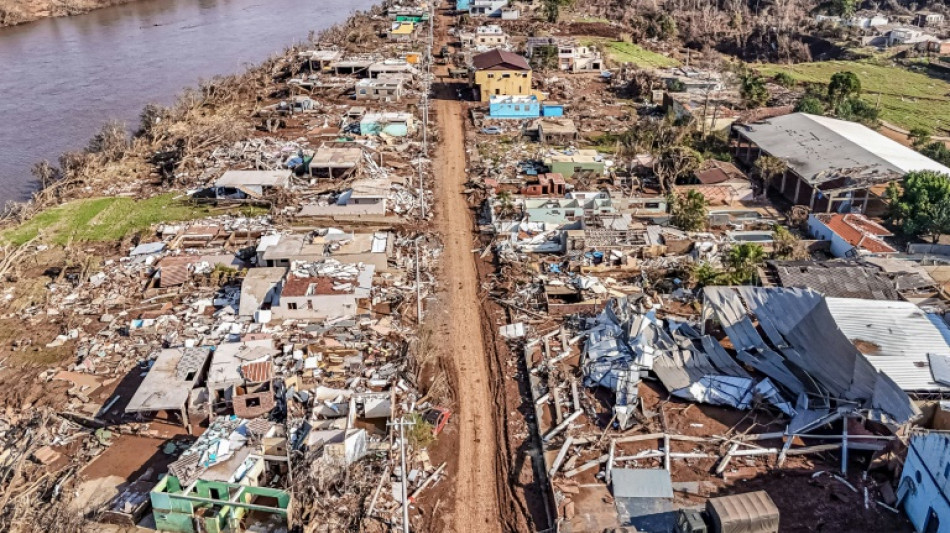
-
 Munsey leads Scotland to 207-4 against Italy at T20 World Cup
Munsey leads Scotland to 207-4 against Italy at T20 World Cup
-
Japan restarts world's biggest nuclear plant again

-
 Bangladesh poll rivals rally on final day of campaign
Bangladesh poll rivals rally on final day of campaign
-
Third impeachment case filed against Philippine VP Duterte

-
 Wallaby winger Nawaqanitawase heads to Japan
Wallaby winger Nawaqanitawase heads to Japan
-
Thailand's Anutin rides wave of nationalism to election victory

-
 Venezuela's Machado says ally kidnapped by armed men after his release
Venezuela's Machado says ally kidnapped by armed men after his release
-
Maye longs for do-over as record Super Bowl bid ends in misery

-
 Seahawks' Walker rushes to Super Bowl MVP honors
Seahawks' Walker rushes to Super Bowl MVP honors
-
Darnold basks in 'special journey' to Super Bowl glory

-
 Japan's Takaichi may struggle to soothe voters and markets
Japan's Takaichi may struggle to soothe voters and markets
-
Seahawks soar to Super Bowl win over Patriots

-
 'Want to go home': Indonesian crew abandoned off Africa demand wages
'Want to go home': Indonesian crew abandoned off Africa demand wages
-
Asian stocks track Wall St rally as Tokyo hits record on Takaichi win

-
 Bad Bunny celebrates Puerto Rico in joyous Super Bowl halftime show
Bad Bunny celebrates Puerto Rico in joyous Super Bowl halftime show
-
Three prominent opposition figures released in Venezuela

-
 Israeli president says 'we shall overcome this evil' at Bondi Beach
Israeli president says 'we shall overcome this evil' at Bondi Beach
-
'Flood' of disinformation ahead of Bangladesh election

-
 Arguments to begin in key US social media addiction trial
Arguments to begin in key US social media addiction trial
-
Agronomics Limited Announces Net Asset Value Calculation as at 31 December 2025

-
 UK-Based Vesalic Limited Emerges from Stealth with Landmark Discovery of Potential Non-CNS Driver of Motor Neuron Diseases, including ALS, and Breakthrough Therapeutic and Diagnostic Opportunities
UK-Based Vesalic Limited Emerges from Stealth with Landmark Discovery of Potential Non-CNS Driver of Motor Neuron Diseases, including ALS, and Breakthrough Therapeutic and Diagnostic Opportunities
-
Gotterup tops Matsuyama in playoff to win Phoenix Open

-
 New Zealand's Christchurch mosque killer appeals conviction
New Zealand's Christchurch mosque killer appeals conviction
-
Leonard's 41 leads Clippers over T-Wolves, Knicks cruise

-
 Trump says China's Xi to visit US 'toward the end of the year'
Trump says China's Xi to visit US 'toward the end of the year'
-
Real Madrid edge Valencia to stay on Barca's tail, Atletico slump

-
 Malinin keeps USA golden in Olympic figure skating team event
Malinin keeps USA golden in Olympic figure skating team event
-
Lebanon building collapse toll rises to 9: civil defence

-
 Real Madrid keep pressure on Barca with tight win at Valencia
Real Madrid keep pressure on Barca with tight win at Valencia
-
PSG trounce Marseille to move back top of Ligue 1

-
 Hong Kong to sentence media mogul Jimmy Lai in national security trial
Hong Kong to sentence media mogul Jimmy Lai in national security trial
-
Lillard will try to match record with third NBA 3-Point title

-
 Vonn breaks leg as crashes out in brutal end to Olympic dream
Vonn breaks leg as crashes out in brutal end to Olympic dream
-
Malinin enters the fray as Japan lead USA in Olympics team skating

-
 Thailand's Anutin readies for coalition talks after election win
Thailand's Anutin readies for coalition talks after election win
-
Fans arrive for Patriots-Seahawks Super Bowl as politics swirl

-
 'Send Help' repeats as N.America box office champ
'Send Help' repeats as N.America box office champ
-
Japan close gap on USA in Winter Olympics team skating event

-
 Liverpool improvement not reflected in results, says Slot
Liverpool improvement not reflected in results, says Slot
-
Japan PM Takaichi basks in election triumph

-
 Machado's close ally released in Venezuela
Machado's close ally released in Venezuela
-
Dimarco helps Inter to eight-point lead in Serie A

-
 Man City 'needed' to beat Liverpool to keep title race alive: Silva
Man City 'needed' to beat Liverpool to keep title race alive: Silva
-
Czech snowboarder Maderova lands shock Olympic parallel giant slalom win

-
 Man City fight back to end Anfield hoodoo and reel in Arsenal
Man City fight back to end Anfield hoodoo and reel in Arsenal
-
Diaz treble helps Bayern crush Hoffenheim and go six clear

-
 US astronaut to take her 3-year-old's cuddly rabbit into space
US astronaut to take her 3-year-old's cuddly rabbit into space
-
Israeli president to honour Bondi Beach attack victims on Australia visit

-
 Apologetic Turkish center Sengun replaces Shai as NBA All-Star
Apologetic Turkish center Sengun replaces Shai as NBA All-Star
-
Romania, Argentina leaders invited to Trump 'Board of Peace' meeting


Climate misinformation overshadows record floods worldwide
Climate skeptics are scapegoating a weather modification technique known as cloud seeding to deny the role of global warming in historic floods that have recently devastated countries from Brazil to Kenya.
Record rainfall brought to some regions by the natural weather cycle El Nino matches an expected increase in extreme events, experts say.
But online, claims have repeatedly been made that geoengineering –- not carbon emissions –- is to blame.
"Dubai airport looks like an apocalyptic movie. Videos of the flooding are insane," said Robby Starbuck, a conservative American commentator, to his more than 460,000 followers on X in April, after the Gulf city was hit by unprecedented downpours.
"I've seen some blaming climate change when the cause is actually from the use of weather modification. Cloud seeding where chemicals are sprayed in clouds to create rain caused this."
Claims that weather had been manipulated appeared after every major flood this year, including in Zimbabwe, the United Arab Emirates and other nations. According to Google Trends data, searches for cloud seeding reached a record high after the Dubai floods in April.
"I have not agreed to our planet having cloud seeding everywhere, have you?" was typical of posts among X users in late May, blaming the recent rainfall on a "man-made climate crisis."
Cloud seeding, which introduces tiny particles into the sky to induce rain over small geographical areas, has gained popularity worldwide as a way to combat drought and increase local water supplies.
But scientists say the technique cannot create weather -- nor can it trigger rainfall at the scale observed in countries such as Germany and the United States.
"Due to the strong natural variability of clouds, there exists very little scientific proof that cloud seeding has indeed a measurable effect on precipitation," said Andrea Flossmann, co-chair of an expert team on weather modification at the World Meteorological Organization.
Experts, meanwhile, say climate change doubled the likelihood of floods in southern Brazil and worsened the intense rains caused by El Nino.
"There's definitely a consensus that climate change is responsible for many of these extreme weather events," said Mariana Madruga de Brito, a Brazilian scientist from Rio Grande do Sul, the state that suffered historic flooding in May.
She told AFP she saw people posting photos of clouds on social media shortly after the floods, claiming they had been "fabricated" and questioning scientific institutions.
But she insisted cloud seeding "cannot be causing events of this magnitude."
- Reinforcing climate denial -
Di Yang, an assistant professor at the University of Wyoming, said extensive research over several decades has shown "no definitive large-scale or long-term impacts from cloud seeding."
Still, the technique has become a recurring target for climate skeptics. AFP has debunked several false claims of weather manipulation after major floods in recent years.
Callum Hood, head of research at the Center for Countering Digital Hate, said that as severe weather events become more frequent, "climate deniers are putting extra efforts into claiming these extremes have nothing to do with climate change."
"You see this every summer now," he told AFP.
As more changes are recorded in seasons and ecosystems, Hood said "a slightly more conspiratorial and newer argument" is overtaking older narratives that simply deny Earth's warming "by trying to argue that extreme weather events have this other cause, whether it's geoengineering or something else."
Lincoln Muniz Alves, a researcher at the Brazil National Institute for Space Research, said the dissemination of false narratives not only obstructs effective communication during environmental crises but also "reinforces the views of those who deny the reality of climate change."
Weather modification methods are controversial in the scientific community, due in part to the potential for unintended consequences such as excess rain and pollution.
But experts say such caution should not discredit the reality of the climate crisis.
"This focus on cloud seeding misses the larger picture –- for more than a century, humans have been releasing greenhouse gasses (that) have warmed the planet and made heavy rain more likely in many regions of the world," said Edward Gryspeerdt, a research fellow at Imperial College London's Grantham Institute.
"We are already manipulating the weather at a global scale (larger) than would ever be possible through cloud seeding."
L.Harper--AMWN


